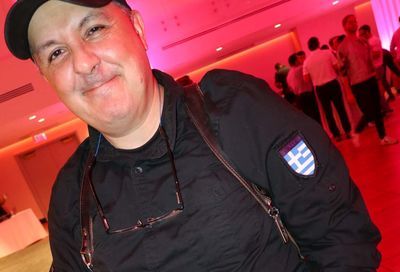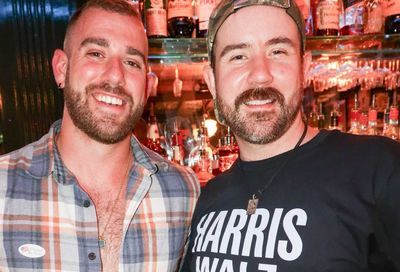Fairy Tale
Robert Rodi weaves a satiric tale of body-switching that highlights -- and bridges -- the gulf between generations in 'When You Were Me'
Oh, to be young again! That’s the sentiment driving Robert Rodi’s new comic novel, When You Were Me ().
Jack Ackerly is 53. He spent his youth beavering away at establishing his own public-relations firm, hitting the jackpot when he sold it to a multinational company for a ridiculous amount of money. But, Jack discovers, a 13-room condo in Chicago can’t bring you happiness when your lover of 21 years has stepped out of the relationship. The dating game is going so poorly that he can’t even tempt an opera-queen shop clerk with the Lyric’s hottest tickets. And that nonprofit theater company that performs ’70s sitcoms in the buff — they’ve thrown him off the board.
Enter Francesca, the klutzy witch. She can’t make Jack young again, but, if he can find a willing partner, she can trade consciousnesses between the two. But what young man would want to be 53, even with Jack’s millions? That would be Corey Szaslo, a 26-year-old, recovering meth addict and party boy who has the distinct (and well-warranted) sense that he’s stayed at the party a little too long. With Francesca’s help, they trade bodies. Jack gets the marathon sexual adventures he’s seeking; Corey escapes penury. Multiple mishaps ensue — you should be careful what you wish for.
Rodi possesses a real gift for creating quirky characters, odd-balls who fall just short of being cartoonish. Witch Francesca is one, forever snagging her purse on a door handle or busting a blouse seam. So is Jack’s friend Walt, whose recent discover that he’s part Jewish leads him to liberally spice his speech with Yiddish. Even Corey is somewhat off-kilter, with just enough slacker charm and attitude that he avoids coming off as a sad-sack loser. Set against these slightly weird characters, bland Jack becomes something of an everyman, the only sane person in a world gone mad.
The city of Chicago, which Rodi clearly loves, serves as another major character. When You is almost a tourist guide, breezily wandering the town from Andersonville to Boys Town to Wicker Park. One favorite scene is when Jack (in Corey’s body) shows up on a mission at the gay bar Sidetrack for show-tunes night. Is there anything anywhere else like it?
Advertisement
|
The gift for creating distinctly original characters goes hand in hand with Rodi’s satiric eye. The most cutting scene is no doubt the cocktail party Jack throws so that Corey (working as bartender) can see his friends and colleagues firsthand. It’s a wonder that the collection of nervous tics, foul body odors, face lifts gone awry and cruel gossip doesn’t lead Corey to abandon the deal altogether.
Yet When You Were Me is anything but a sour book, partly because the narrative uses these misfits as foils to advance both Jack and Corey’s more winning traits. If not being familiar with your body’s past can lead you inadvertently to try to pick up the trick you had dumped disastrously six months before, it can also allow you to say true things you wouldn’t have said for fear of hurting your then-friend’s feelings.
Underneath the fun and frivolity, Rodi works some major themes that also brighten the book’s overall outlook. Ever since Dorian Grey hung his portrait in the attic and let it bear the consequences of his debaucheries, the pursuit and loss of youth has been a major theme in modern gay lit. Christopher Isherwood’s deeply affecting A Single Man (1964) and Mark Merlis brilliant Washington novel, Man About Town (2004) both explore what happens to middle age gay men who, like Jack, find themselves abruptly alone in the world.
Rodi pursues a slightly different variation on this theme. Thanks to almost 40 years of gay activism, there is now an active cohort of long out gay men entering retirement age, their estrangement from their younger counterparts exacerbated by the chasm created by the AIDS epidemic in the ’80s and early ’90s. What better way to bridge the gap than to have youth and age see the world literally through each others eyes.
Bridging the gap is certainly the point in the book’s climactic moment, a kind of epic mind meld reinforcing the sexual brotherhood of gay mankind. Yes, everyone does live happily ever after. How else would a fairy tale end?
Support Metro Weekly’s Journalism
These are challenging times for news organizations. And yet it’s crucial we stay active and provide vital resources and information to both our local readers and the world. So won’t you please take a moment and consider supporting Metro Weekly with a membership? For as little as $5 a month, you can help ensure Metro Weekly magazine and MetroWeekly.com remain free, viable resources as we provide the best, most diverse, culturally-resonant LGBTQ coverage in both the D.C. region and around the world. Memberships come with exclusive perks and discounts, your own personal digital delivery of each week’s magazine (and an archive), access to our Member's Lounge when it launches this fall, and exclusive members-only items like Metro Weekly Membership Mugs and Tote Bags! Check out all our membership levels here and please join us today!























